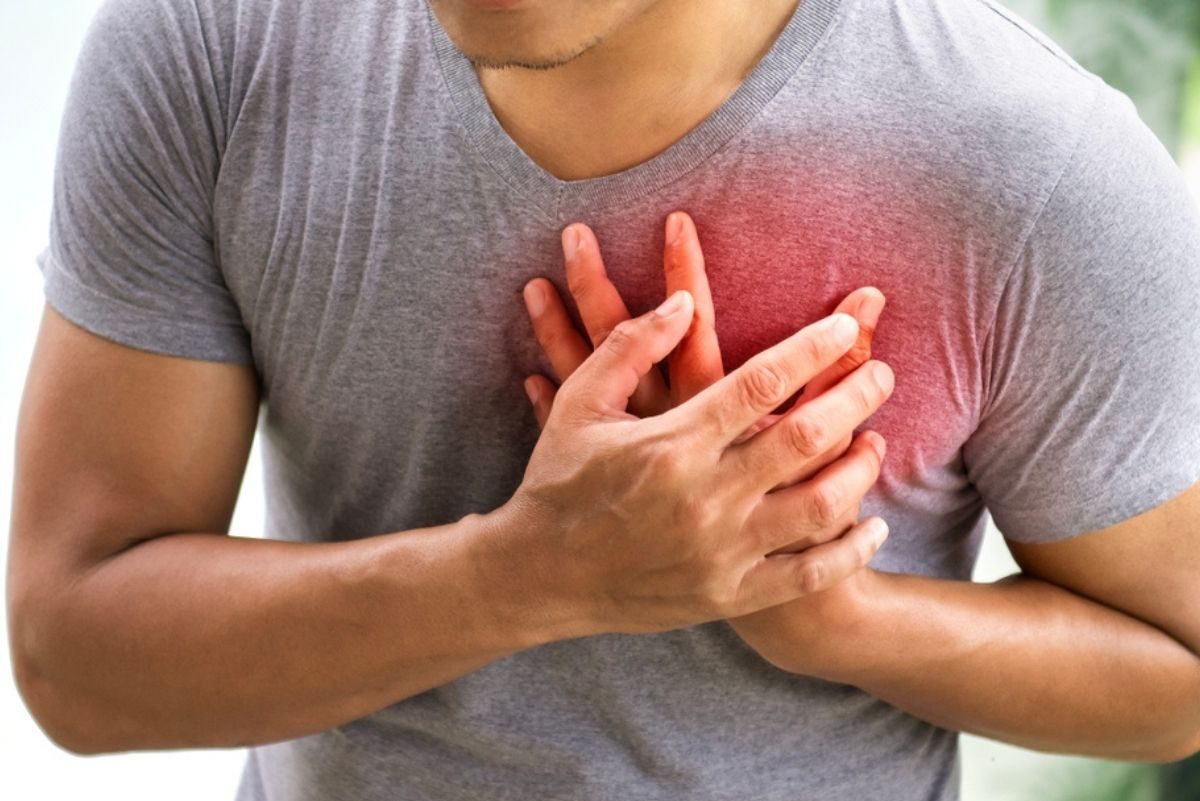Every 40 seconds someone in the United States has a heart attack, according to the Centers for Disease Control and Prevention and while heart disease is the leading cause of death for both men and women, the majority of cases can be prevented with healthy lifestyle choices like not smoking and exercising on a regular basis. The American Heart Association states, "An estimated 80% of cardiovascular disease, including heart disease and stroke, are preventable." Knowing the signs your heart could be in trouble is key to getting your heart health back on track and Eat This, Not That! Health spoke with Dr. Jeffrey Newman is the Medical Director of Cardiothoracic Surgery at Delray Medical Center, part of the Palm Beach Health Network who shares signals to look out for. Read on—and to ensure your health and the health of others, don't miss these Sure Signs You've Already Had COVID.
Dr. Newman says, "In general, a normal heart muscle strength is measured as an ejection fraction. A normal ejection fraction is say 55% or 60%. This means that if the heart fills with 100 ounces of blood each cycle, it will pump out 60 ounces, which would be a very normal heart. If your heart begins to weaken, related to a heart attack, or valvular heart disease, the ejection fraction declines. If a patient is told they have an ejection fraction of 30%, so they're filling up with 100 ounces of blood each cycle but only pumping out 30 ounces – as you can imagine that leads to less cardiac output with the cycle of your heart pumping. That's what leads to heart failure. The lower your ejection fraction, the more likely you are to have heart failure and sudden cardiac death. In general, below a certain range is where people start getting into trouble, the threshold is about 40%."

Dr. Newman tells us, "We all have relatively strong hearts – assuming you haven't had a heart attack or valvular heart disease. That's where eating a heart-healthy diet, exercising and not becoming morbidly obese or leading a sedentary lifestyle comes into play. It's important that you don't end up with several small heart attacks, stressing your heart and having it pump against a larger amount of volume of body mass. Once you've had a heart attack, and you have scarring, a lot of that will never come back. But you can optimize what's left so you don't have more small heart attacks to chip away what's remaining in your chest."

Dr. Newman reminds us, "Heart health is a lifestyle choice for a lot of us in the sense that the most common thing people suffer from is heart attacks. Although there are patients that seem to be fairly fit and they come in and it's just bad luck, there are a lot more patients that are diabetic and who have blood sugars out of control or are not treating themselves fairly, like continuing to smoke and lead sedentary lives that are not doing themselves any favors as they get older. As they get into their 50s, 60s, and 70s, their bodies are starting to decompensate, especially their heart. I'm not saying you're going to live forever, but you want to maximize the potential that you have by just treating yourself fairly."

According to Dr. Newman, "In your activities of daily living, if you can no longer walk from your bedroom to the kitchen without getting winded where you have to sit down and catch your breath – that's an early sign that something is wrong and that your heart is weakening. This means that your heart is not pumping efficiently and the blood can be backing up into your lungs."

Dr. Newman tells us, "If you walk from your bedroom to the kitchen and you're having chest pain where you have to sit down and it goes away once you sit and relax, that's also a good indication that you're at risk for a heart attack."

"Fainting could be a sign that you're having valvular heart problems," Dr. Newman says. "This means that if you pass out in your daily activities, that could be your first sign for aortic stenosis which is the narrowing of the heart valve."

Dr. Newman states, "This is when you're not pumping blood efficiently or your heart isn't moving blood from your lower extremities despite what it should be. If you're having excessive lower extremity swelling that's another sign of a weakening heart."

Checking Her Heart Rate
"Heart racing could mean that your heart is being stressed with limited activity," says Dr. Newman.
The post Sure Signs Your Heart is "Dangerously Weak" appeared first on Eat This Not That.
----------------
By: Heather Newgen
Title: Sure Signs Your Heart is "Dangerously Weak"
Sourced From: www.eatthis.com/sure-signs-your-heart-is-dangerously-weak/
Published Date: Wed, 31 Aug 2022 12:00:37 +0000
Read More
Did you miss our previous article...
https://naturesmart.us/fitness/easy-face-jowl-exercises-to-tighten-up-saggy-skin-fitness-experts-say
 HealthWellnessFitnessBeautyVideosPrivacy PolicyTerms And Conditions
HealthWellnessFitnessBeautyVideosPrivacy PolicyTerms And Conditions
